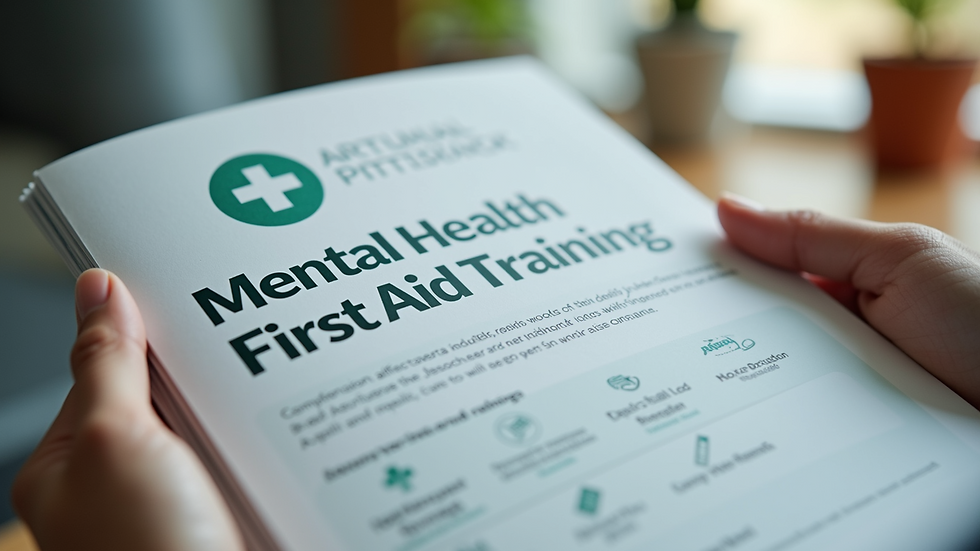Advancing Your Skills in Mental Health Support
- John Mamacan

- Jul 28, 2025
- 4 min read
Mental health support is crucial in today’s fast-paced world. With rising stress levels, anxiety, and depression becoming more common, having skills to support others in mental health crises is essential. This blog will explore various mental health skills, the role of mental health first aiders, ways to enhance your abilities, and how to make a significant impact in your community.
Understanding Mental Health Skills
Mental health skills encompass knowledge and practices that enhance our ability to understand others' psychological well-being. These skills are not just for professionals; anyone can benefit from learning how to support friends, family, and even colleagues. According to the World Health Organization (WHO), mental health issues affect one in four people globally at some point in their lives.
Building mental health skills involves understanding the complexities of emotional and psychological issues. It also means learning to communicate effectively and with empathy. Mental health training can teach vital skills like listening actively, identifying signs of mental health challenges, and knowing when and how to intervene.

Developing Your Mental Health Skills
To develop your mental health skills, you can start by engaging in various forms of education and training. Many organizations offer courses designed to increase your knowledge and comfort level in handling mental health issues. For example, community workshops and online education can provide valuable insights and practical tools.
Consider enrolling in a certificate in mental health first aid. This course equips you with the skills needed to provide initial support to someone experiencing a mental health crisis. Learning these skills not only benefits you but also helps create a more supportive environment for those around you.
Engaging in role-play exercises is another effective way to practice your skills. These exercises allow you to simulate real-life situations, offering you a safe environment to learn how to respond to someone in need effectively.
What is a Mental Health First Aider?
A mental health first aider is a person trained to recognize the signs and symptoms of mental health issues and provide initial support. Their role may involve offering a listening ear, guiding someone to seek further help, and ensuring the individual feels understood and supported.
Mental health first aiders are often found in various settings, from workplaces to educational institutions. According to studies, having mental health first aiders present can significantly reduce stigma and promote a more inclusive environment.

The Importance of Empathy and Active Listening
Empathy and active listening are critical components of effective mental health support. Empathy allows you to connect with someone on an emotional level, making them feel understood. Active listening involves focusing entirely on the speaker, allowing you to capture not only their words but their feelings as well.
Studies show that individuals who feel listened to and validated are more likely to open up about their struggles. By being present and engaged, you demonstrate a level of care that can significantly impact someone's willingness to seek help or share their experiences.
You can practice active listening by:
Maintaining eye contact
Nodding in understanding
Avoiding interruptions
Reflecting what the speaker has said to confirm understanding
These techniques enhance your ability to support others and can lead to more meaningful conversations about mental health.
Creating a Supportive Environment
A supportive environment encourages open discussions about mental health. As a mental health supporter, you can help foster such an atmosphere by starting conversations about mental well-being in your community or workplace.
Consider organizing events that focus on mental health awareness. Hosting a workshop, movie screening, or speaker series can provide a platform for discussions while educating individuals about mental health issues.
Statistics by the Mental Health Foundation indicate that community engagement significantly reduces stigma surrounding mental illness. Being proactive in creating a supportive community can help promote mental health as a vital part of overall well-being.

Taking Action and Making a Difference
To advance your skills in mental health support, it’s important to take action. Start small by reaching out to friends or family members, offering your support if they are struggling. You can also advocate for more mental health resources in your community, encouraging local organizations to provide training and increase awareness.
Volunteering at mental health organizations can also enhance your skills. This hands-on experience will boost your confidence and knowledge while making a tangible difference in someone's life.
Lastly, continue educating yourself. The field of mental health is constantly evolving, and staying informed about new research, techniques, and resources will enhance your skills.
Embracing Continuous Growth
Advancing your skills in mental health support is a continuous journey. By actively seeking resources and learning opportunities, you position yourself to make a greater impact in the lives of those around you.
Incorporate what you learn into your everyday interactions. Practice patience, understanding, and compassion. The more you apply these skills, the more effective you will become at supporting others.
Embrace this journey with an open heart and mind. Every small effort contributes to a larger movement of mental health awareness and support. By investing in yourself, you are also contributing positively to society, fostering a culture of understanding and support.
Each step you take towards advancing your mental health skills equips you with the tools to help others during their most challenging times. Whether through formal training or everyday practice, every action counts. Remember, your skills can be the lifeline someone needs.



Comments